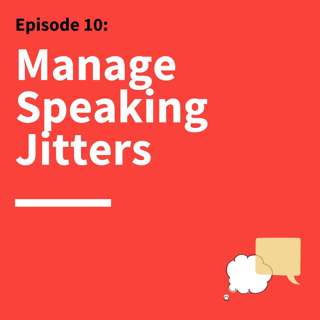
10. High-Stakes Communication: How to Manage Anxiety When Speaking in Front of Others
Most people feel nervous in situations such as speaking in front of a class, pitching a big idea, or giving a toast, yet research-backed techniques can help manage both the symptoms and sources of our speaking jitters.Matt Abrahams sits in the interviewee chair for this episode and talks with the podcast's producer, Jenny Luna, to share his backstory with public speaking anxiety and how by recognizing the causes of our nervousness, and applying mitigating techniques, we can gain confidence in our communication. Connect:Premium Signup >>>> Think Fast Talk Smart PremiumEmail Questions & Feedback >>> hello@fastersmarter.ioEpisode Transcripts >>> Think Fast Talk Smart WebsiteNewsletter Signup + English Language Learning >>> FasterSmarter.ioThink Fast Talk Smart >>> LinkedIn, Instagram, YouTubeMatt Abrahams >>> LinkedIn *****Thank you to our sponsors. These partnerships support the ongoing production of the podcast, allowing us to bring it to you for free.This episode is brought to you by Stanford Continuing Studies. This fall, join me for "Communication Essentials for Work and Life," Enroll Today!
7 Maj 202017min

9. Quick Thinks: How Being Present-Oriented Improves Communication
Although it may feel counter intuitive, letting go of our prepared notes and focusing on the present can help us communicate more effectively.In this Quick Thinks episode, host Matt Abrahams speaks with Stanford University lecturers and improv theater experts Dan Klein and Adam Tobin on how staying in the moment allows communicators to connect with their audience. Connect:Premium Signup >>>> Think Fast Talk Smart PremiumEmail Questions & Feedback >>> hello@fastersmarter.ioEpisode Transcripts >>> Think Fast Talk Smart WebsiteNewsletter Signup + English Language Learning >>> FasterSmarter.ioThink Fast Talk Smart >>> LinkedIn, Instagram, YouTubeMatt Abrahams >>> LinkedIn *****Thank you to our sponsors. These partnerships support the ongoing production of the podcast, allowing us to bring it to you for free.This episode is brought to you by Stanford Continuing Studies. This fall, join me for "Communication Essentials for Work and Life," Enroll Today!
23 Apr 20206min
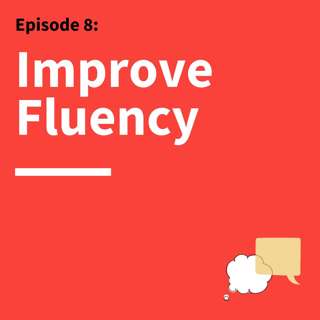
8. Don't Get Lost in Translation: How Non-Native Speakers Can Communicate With Confidence
Having to communicate in a language other than our native tongue can be quite a challenge. In this podcast episode, host Matt Abrahams speaks with Ken Romeo, the Associate Director for the Stanford Language Center, on specific tactics and approaches non-native speakers can use to prepare for speeches or presentations. Ken also shares advice on how to handle in-the-moment challenges, improve fluency, and let go of the need for perfection.Connect:Premium Signup >>>> Think Fast Talk Smart PremiumEmail Questions & Feedback >>> hello@fastersmarter.ioEpisode Transcripts >>> Think Fast Talk Smart WebsiteNewsletter Signup + English Language Learning >>> FasterSmarter.ioThink Fast Talk Smart >>> LinkedIn, Instagram, YouTubeMatt Abrahams >>> LinkedIn *****Thank you to our sponsors. These partnerships support the ongoing production of the podcast, allowing us to bring it to you for free.This episode is brought to you by Stanford Continuing Studies. This fall, join me for "Communication Essentials for Work and Life," Enroll Today!
10 Apr 202017min

7. Quick Thinks: Use This Framework to Speak up in Virtual Meetings
We've all been in the situation where you have something important to contribute to a meeting and you don't know how to insert your thoughts. On this Quick Thinks episode of Think Fast, Talk Smart, podcast host Matt Abrahams offers the three ways to insert your ideas, either by paraphrasing, asking a question, or stating an emotion. He also outlines the "What, So What, Now What" framework and explains how to use this structure to communicate your ideas more effectively. Connect:Premium Signup >>>> Think Fast Talk Smart PremiumEmail Questions & Feedback >>> hello@fastersmarter.ioEpisode Transcripts >>> Think Fast Talk Smart WebsiteNewsletter Signup + English Language Learning >>> FasterSmarter.ioThink Fast Talk Smart >>> LinkedIn, Instagram, YouTubeMatt Abrahams >>> LinkedIn *****Thank you to our sponsors. These partnerships support the ongoing production of the podcast, allowing us to bring it to you for free.This episode is brought to you by Stanford Continuing Studies. This fall, join me for "Communication Essentials for Work and Life," Enroll Today!
3 Apr 20204min
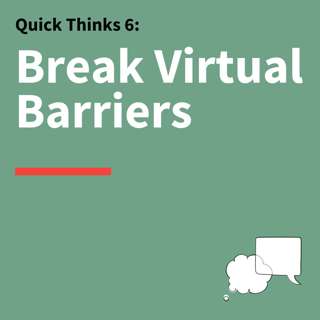
6. Quick Thinks: Communicating and Leading Virtually
Leading successful meetings remotely and being a strong speaker on-screen require specific skills. Communicating effectively has to do with your presence, ability to leverage tools, and your audience engagement. In this Quick Thinks episode, Stanford GSB Strategic Communications lecturer Matt Abrahams shares best practices for becoming a more effective and engaging online communicator. Connect:Premium Signup >>>> Think Fast Talk Smart PremiumEmail Questions & Feedback >>> hello@fastersmarter.ioEpisode Transcripts >>> Think Fast Talk Smart WebsiteNewsletter Signup + English Language Learning >>> FasterSmarter.ioThink Fast Talk Smart >>> LinkedIn, Instagram, YouTubeMatt Abrahams >>> LinkedIn *****Thank you to our sponsors. These partnerships support the ongoing production of the podcast, allowing us to bring it to you for free.This episode is brought to you by Stanford Continuing Studies. This fall, join me for "Communication Essentials for Work and Life," Enroll Today!
27 Mars 20207min
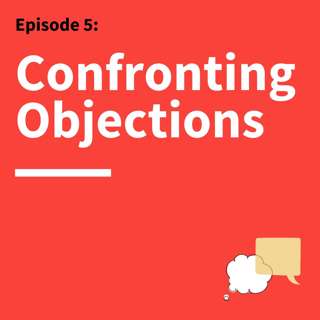
5. From Monologue to Dialogue: How to Handle a Skeptical Audience
Preparing to speak in front of a skeptical audience is more than thinking about objections beforehand – there are specific techniques you can use to respond to these challenging situations without sounding defensive, evasive, or dismissive. Here, we offer a few key tips for how to handle skepticism with aplomb.In this podcast, host Matt Abrahams and Stanford GSB lecturer Burt Alper share how to prepare for these challenges from your audience and discuss the importance of tactics like acknowledging audience input, reframing responses, and how to remain cool, collected, and credible. Connect:Premium Signup >>>> Think Fast Talk Smart PremiumEmail Questions & Feedback >>> hello@fastersmarter.ioEpisode Transcripts >>> Think Fast Talk Smart WebsiteNewsletter Signup + English Language Learning >>> FasterSmarter.ioThink Fast Talk Smart >>> LinkedIn, Instagram, YouTubeMatt Abrahams >>> LinkedIn *****Thank you to our sponsors. These partnerships support the ongoing production of the podcast, allowing us to bring it to you for free.This episode is brought to you by Stanford Continuing Studies. This fall, join me for "Communication Essentials for Work and Life," Enroll Today!
12 Mars 202019min
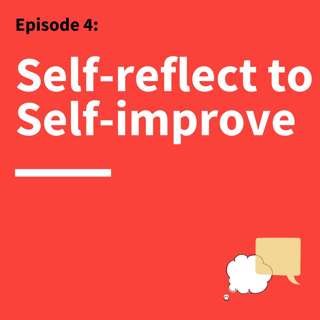
4. The Journey to Mastery: How Self Reflection Can Improve Communication
What does it mean to truly master communication? How can we speak and write for the most impact? In this podcast episode of Think Fast, Talk Smart, Stanford Graduate School of Business lecturers JD Schramm and Matt Abrahams discuss how to use self reflection for self improvement. They also offer methods for preparing for a high stakes situation such as a pitch meeting or an everyday interaction like an email. Connect:Premium Signup >>>> Think Fast Talk Smart PremiumEmail Questions & Feedback >>> hello@fastersmarter.ioEpisode Transcripts >>> Think Fast Talk Smart WebsiteNewsletter Signup + English Language Learning >>> FasterSmarter.ioThink Fast Talk Smart >>> LinkedIn, Instagram, YouTubeMatt Abrahams >>> LinkedIn *****Thank you to our sponsors. These partnerships support the ongoing production of the podcast, allowing us to bring it to you for free.This episode is brought to you by Stanford Continuing Studies. This fall, join me for "Communication Essentials for Work and Life," Enroll Today!
27 Feb 202018min
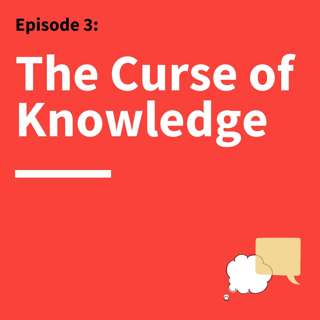
3. When Knowing Too Much Can Hurt Your Communication: How to Make Complex Ideas Accessible
As communicators, we often need to take complex information (e.g., financial, technical, or scientific) and make it more understandable for our audience – we’re experts and they likely aren’t. But having so much knowledge on the topics we discuss can often make the job more difficult: we dive in too quickly, forget about our audience's needs, or use jargon that goes over their heads. In this episode of Think Fast, Talk Smart, strategic communications lecturers Matt Abrahams and Lauren Weinstein explore the “curse of knowledge” and offer specific techniques you can use to be more successful in getting your point across.Connect:Premium Signup >>>> Think Fast Talk Smart PremiumEmail Questions & Feedback >>> hello@fastersmarter.ioEpisode Transcripts >>> Think Fast Talk Smart WebsiteNewsletter Signup + English Language Learning >>> FasterSmarter.ioThink Fast Talk Smart >>> LinkedIn, Instagram, YouTubeMatt Abrahams >>> LinkedIn *****Thank you to our sponsors. These partnerships support the ongoing production of the podcast, allowing us to bring it to you for free.This episode is brought to you by Stanford Continuing Studies. This fall, join me for "Communication Essentials for Work and Life," Enroll Today!
11 Feb 202016min






















